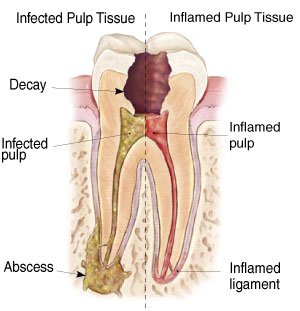Root Canal Treatment
Root canal treatments, also called endodontic treatments, include root canal therapy (root canal treatment), re-treatment, surgery, cracked teeth, and traumatic dental injuries. Please go to American Association of Endodontists – Patient Information for detail explanations.
Root canal therapy (root canal treatment) main purpose is to save natural tooth and prevent extraction. This treatment generally involves removing the nerve tissue (pulp) that has become unhealthy or dead in the center of the tooth. The interior of the tooth (root canal or root canals) is thoroughly cleansed under a surgical operating microscope with specialized instruments and solutions. Then, it is filled with a special material that conforms to the unique anatomy of this tooth root canal system. Finally, the tooth is sealed with a temporary filling material. Your dentist will replace this temporary filling with a permanent filling or a cap (crown).
Re-treatment and surgery are complications from a tooth had prior root canal therapy. Cracked teeth and traumatic dental injuries involving pulp damage will require root canal therapy.
After Treatment
After root canal therapy or re-treatment completion, our office will send a report to your restorative dentist. Your tooth is sealed with temporary restoration. Your restorative dentist will decide on what type of restoration is necessary to permanently re-build and protect this tooth. You need to contact your restorative dentist for this root canal therapy tooth’s follow-up restoration within 2 to 6 weeks to prevent re-contamination of the root canal(s) or fracture of this tooth.
After Surgery
Immediately after surgery, some discomfort and slight swelling will occur while incisions at surgical site are healing. This is normal for any surgical procedure. Pain medication will control post-operative discomfort. Usually, sutures will be removed in 5 to 7 days and surgical incisions will heal after 2 weeks.
Root Canal Therapy with Cutting-Edge Technology
At our practice, we’re proud to incorporate the latest advancements in endodontic technology to ensure precise, efficient, and comfortable care for our patients. Our use of Surgical Microscopy, 3D Cone Beam CT Imaging, and Laser-Assisted Endodontics allows us to achieve the highest standards in root canal treatment.
Surgical Microscope
Surgical microscopes are essential tools in modern endodontics. They significantly enhance visibility and illumination during root canal procedures, allowing for detailed visualization of the tooth’s complex internal anatomy. With high magnification and powerful lighting, we can perform treatment with exceptional precision, improving both accuracy and outcomes.
3D Dental Imaging / Cone Beam CT (CBCT)
Cone Beam Computed Tomography provides comprehensive 3D imaging of the teeth, jawbone, and surrounding structures. This advanced imaging technology enables us to detect curved or hidden canals, bone loss, and other intricate anatomical features that traditional X-rays may miss. CBCT plays a vital role in diagnosis, treatment planning, and post-treatment monitoring -resulting in more predictable results and better long-term outcomes.
Laser-Assisted Endodontics
Laser technology, when combined with passive ultrasonic irrigation, has transformed the field of endodontics. By using lasers at specific wavelengths, we can perform minimally invasive procedures on both hard and soft tissues. This approach improves disinfection, reduces treatment time, minimizes discomfort, and promotes faster healing - enhancing the overall patient experience. We’re committed to utilizing the most advanced tools and techniques available to deliver exceptional endodontic care. To schedule a consultation, please contact our office at 626-577-0114 or email ichangendo@gmail.com.




